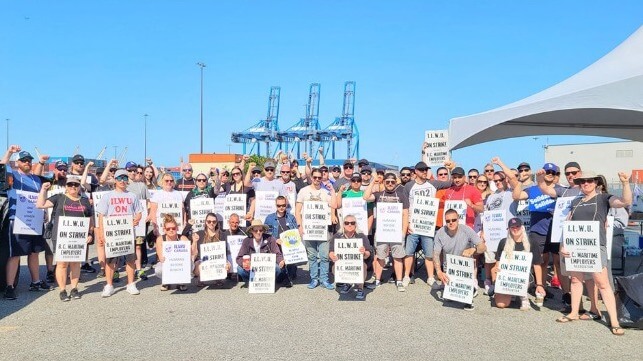West Coast Canadian Port Strike Continues Stopping Cargo at 30 Ports

The longshore strike at Canada’s West Coast ports entered its third day and despite statements from the union for a possible quick resolution, shippers are beginning to prepare for a long strike. Talks were set to resume on Monday after a brief “pause in mediation for health,” the employers’ association said late on Sunday.
The International Longshore & Warehouse Union scheduled the strike to begin Saturday morning, July 1, saying that its approximately 7,500 workers would mostly remain off the job until an agreement is reached. They noted that it is the first time in nearly 30 years that there has been a broad port strike, but under Canadian labor rules grain ships continue to move. In addition, at the end of last week, the union and terminal operators confirmed that they would continue services for cruise ships during the beginning of the peak summer travel season to Alaska.
The strike is impacting two of Canada’s three busiest ports, the Port of Vancouver and Prince Rupert, and a total of 30 ports in British Columbia. Reports are saying that a total of 49 terminals have been impacted and collectively they account for as much as a third of Canada’s foreign trade and commerce. The Canadian Chamber of Commerce is estimating that more than US$600 million worth of cargo moves through the ports each day.
The immediate impact has been lessened as the strike started on July 1, Canada Day, a national holiday. Experts also point out that the volumes have been lower as the U.S. is in a holiday-shortened week with the July 4 celebrations also reducing traffic.
Container xChange, a platform to manage container logistics, sought to quantify the immediate impact on container carriers. They are citing data from Marine Traffic which appears to currently show approximately a total of two dozen container and cargo ships at Vancouver and three tankers. Another dozen ships appear to be in the Pacific outside the harbor with port officials warning that the anchorage will be full and that they will not permit ships to linger in the harbor area for more than 48 hours. Port officials however note that not all of those vessels were being impacted by the strike.
“The strike could have a significant impact on the ports of Vancouver and Prince Rupert, which are crucial gateways for Canada's foreign trade, especially with Asia,” said Christian Roeloffs, Co-founder and CEO of Container xChange. “The disruption caused by the strike can lead to delays, congestion, and inefficiencies in the movement of cargo, affecting various industries and businesses that rely on the smooth functioning of the supply chain.”
Maersk advised customers that Canada’s two major railroads both implemented steps to control volumes effective July 1. CN Rail has reportedly stopped taking all cargoes bound for the West Coast while CP is still accepting dry exports and empties bound for Vancouver. Experts have said that if the strike drags on later into this week, they expect volumes to begin to back up at both Chicago and Detroit in the United States.
The British Columbia Maritime Employers Association reported that it was willing to take steps to settle the dispute including offering to submit the issues to binding arbitration. The union rejected that offer saying that the federal government should permit the negotiations to settle the dispute. So far, Canada’s federal government appears willing to let the negotiations proceed without direct intervention. Federal mediations have been overseeing the talks.
At issue are wages as well as other issues. The union is demanding pay increases to address inflation as well as to recognize the work put in by the dockworkers to keep the supply chain moving during the pandemic. They are also calling for a stop to outsourcing and limits on port automation. Container xChange highlights that the strike comes as container prices at the Port of Vancouver are down three percent in the last month and by two-thirds from the peak in February 2022.

that matters most
Get the latest maritime news delivered to your inbox daily.
On Sunday, the ILWU announced plans for a press conference later in the day which caused immediate rumors of a possible settlement. The union said it had been working hard, with negotiations on Thursday, Friday, and into the weekend, but that there was no agreement. The talks were stopped after 33 hours for both sides to get some rest and scheduled to resume on Monday with the federal mediators.
Concerns are if the strike continues it will both impact the flow of goods as well as vital energy supplies. Canada has been working to lower its domestic inflation with economists warning the strike will pressure the Canadian economy.
